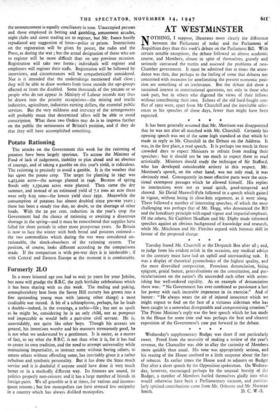Potato Rationing
The attacks on the Government this week for the rationing of potatoes have been largely spurious. To accuse the Minister of Food of lack of judgement, inability to plan ahead and an absence of courage, and of taking a gamble on this year's yield, is ridiculous. The rationing is precisely to avoid a gamble. It is the weather that has upset the potato crop. The target for planting in 1947 was 1,423,000 acres—the acreage planted in 1946. Because of spring floods only 1,330,000 acres were planted. Then came the dry summer, and instead of an estimated yield of 7.1 tons an acre there were only 6.05 tons—the lowest yield since 1931. Meanwhile the consumption of potatoes has almost doubled since pre-war years ; there has been a steady rise due, no doubt, to the shortage of other foods. With the 20 per cent. reduction in the year's crop the Government had the choice of rationing or awaiting a disastrous shortage in the spring—and it must be remembered that supplies have failed for short periods 'in other more prosperous years. So Britain is now to face the winter with both bread and potatoes rationed— the two commodities which during the war were considered un- rationable, the shock-absorbers of the rationing system. The position, of course, looks different according to the comparisons made. If the comparison is with pre-war days it is intolerable ; if with Central and Eastern Europe at the moment it is comfortable.






























 Previous page
Previous page